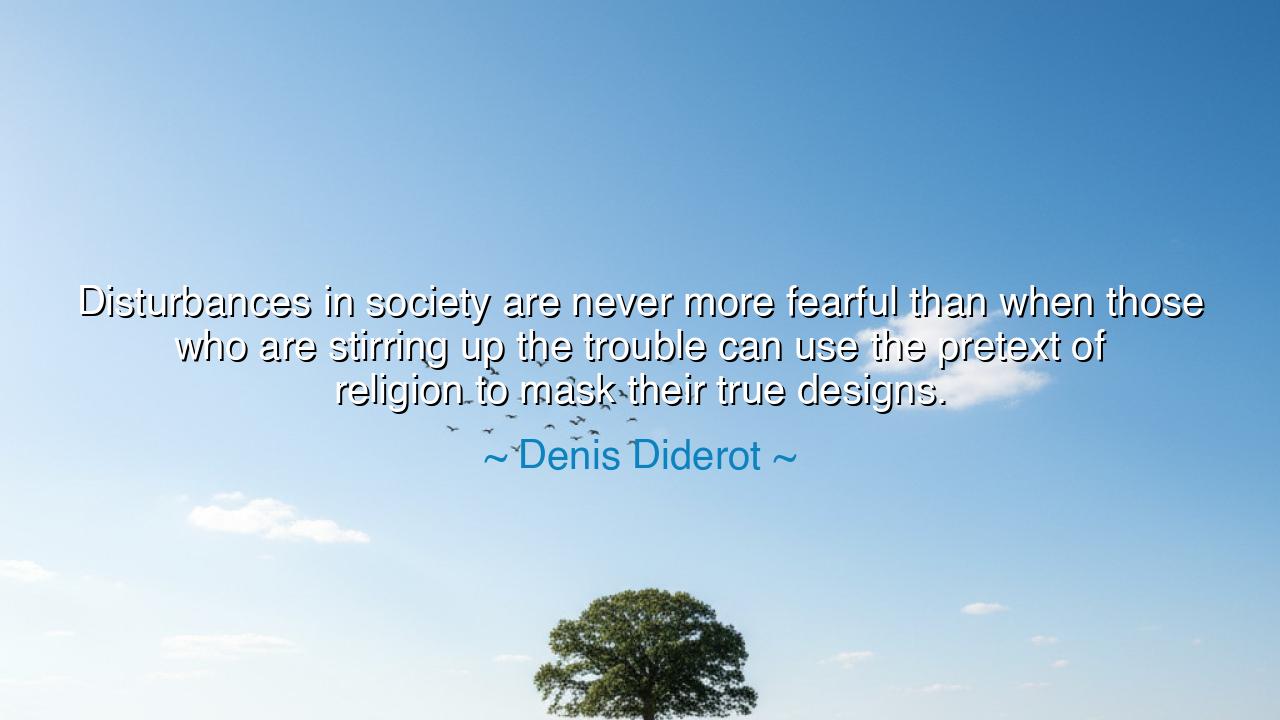
Disturbances in society are never more fearful than when those
Disturbances in society are never more fearful than when those who are stirring up the trouble can use the pretext of religion to mask their true designs.






“Disturbances in society are never more fearful than when those who are stirring up the trouble can use the pretext of religion to mask their true designs.” — Thus spoke Denis Diderot, the bold philosopher of the Enlightenment, who saw with piercing clarity the double-edged power of faith when twisted by ambition. His words ring through the centuries as a warning and a lament: that nothing is more dangerous to peace, nor more deceitful to the soul, than the corruption of the sacred for the sake of power. For when men take the holy and turn it into a weapon, they clothe darkness in the garments of light — and nations bleed beneath the banner of righteousness.
In Diderot’s age, Europe was still haunted by the ghosts of its religious wars, when brother slew brother in the name of heaven. The philosopher, who sought truth through reason and compassion, saw how easily zeal could be manipulated, how the cry of “God wills it!” could conceal the greed of kings, the vanity of priests, or the hunger for dominion. To him, religion was sacred when pure, but terrifying when perverted by politics. He did not speak against faith itself — for faith can heal, enlighten, and uplift — but against the mask of faith, worn by those whose true gods are power and control.
Throughout history, his warning has echoed again and again. Consider the Crusades, when multitudes marched under the sign of the cross, believing they fought for God, yet often serving the ambitions of princes and popes. The holy cause became a cloak for conquest. Cities burned, innocents perished, and Christ’s message of love was drowned in the thunder of war. The pretext of religion gave these deeds a false halo, sanctifying greed with sacred words. Thus was Diderot’s fear made flesh — that men can commit the darkest deeds when they believe heaven stands behind them.
Yet this danger is not confined to the past. In every era, there are those who drape their selfish aims in moral language — who stir divisions in the name of virtue, who turn belief into a battlefield. When power disguises itself as piety, when hatred is justified as holiness, then society trembles on the brink of ruin. For nothing unites and divides the human heart more deeply than belief. It can make saints of men — or demons wearing the vestments of priests.
But Diderot’s words are not meant to breed despair — they are meant to awaken discernment. The wise must learn to see beyond appearances, to test every cry of righteousness against the measure of compassion. True faith, he would remind us, does not thirst for domination, nor seek to destroy. It builds, it heals, it forgives. Any movement that sows hatred in the name of heaven is not divine — it is deception. The soul that loves truth must be vigilant, for the holiest words can be twisted into chains if the listener does not think and the heart does not feel.
Let us remember, too, the story of Martin Luther King Jr., who faced the very same peril from the opposite side — for his enemies also invoked religion to defend injustice. Yet King, guided by love, reclaimed the true essence of faith. He did not wield religion as a weapon, but as a light. He showed that belief, when purified by compassion, becomes the most powerful force for peace. Through his life, we see the difference between those who use religion and those who live it.
The lesson, then, is timeless and clear: be wary of those who speak of God while serving only themselves. Question the voices that demand division in the name of the divine. True spirituality is never violent, never proud, never manipulative. It is humble and life-giving, flowing like a river that nourishes all. Beware the pretext, but do not lose faith in the sacred. Hold fast to what is pure and just, and never let your reverence be hijacked by the cunning or the cruel.
For Diderot’s wisdom is not a call to abandon belief, but to purify it through reason and love. He warns us that the gravest evil is not godlessness, but hypocrisy — not ignorance, but the cunning heart that cloaks ambition in sanctity. Let every generation, then, learn to discern truth from pretense, spirit from shadow. For when the sacred is kept pure, it unites the world; but when it is defiled by deceit, it can set the world aflame. And thus, through vigilance and compassion, may we ensure that the voice of faith forever serves the cause of truth — and not the designs of those who would wear its name in vain.






AAdministratorAdministrator
Welcome, honored guests. Please leave a comment, we will respond soon